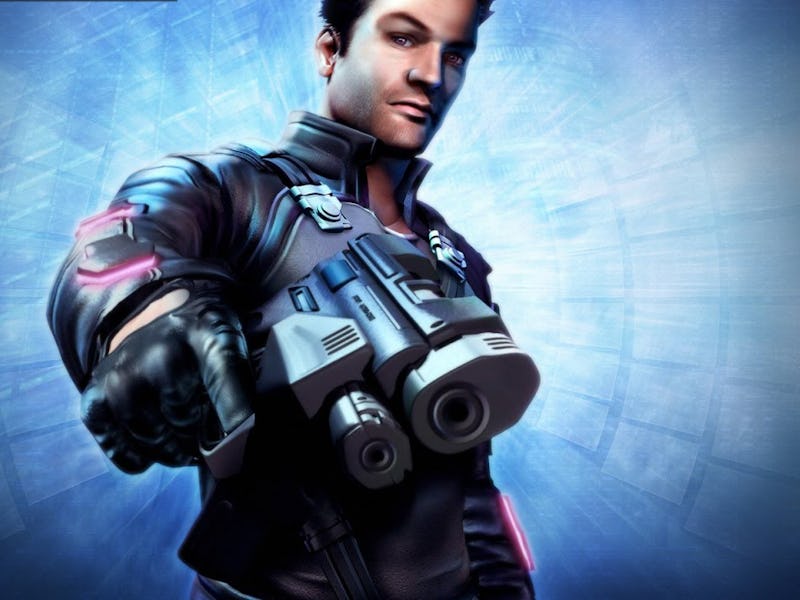One of the Most Disappointing Sequels Ever Predicted the Future of Gaming
Following up an instant classic is a thankless job.

Deus Ex earned about as much praise as a game is capable of receiving. The moody cyberpunk blend of FPS and RPG was lauded for the agency it gave players in approaching its levels and shaping its protagonist, counterterrorist agent JC Denton. Its story about Denton’s attempt to unravel a global conspiracy in the bleak future of 2052 offers far more depth than the “Shoot all the Nazis” or “Shoot all the dinosaurs” narratives of its contemporaries, especially once dialogue choices begin changing the world. Even your morality is relevant: make Denton a tank who shoots everything that moves and characters will react differently than if he’s a sneaky pacifist.
By modern standards, it’s a clunky, intimidating title (to place Deus Ex in historical context, one reviewer griped about save files adding up to a staggering 250 megabytes). But it’s a mainstay of “greatest games ever” lists and an influence on games ranging from Dishonored to Cyberpunk 2077. Its sequel, 2003’s Deus Ex: Invisible War, was expected to improve on the thrilling new standard it set. It… did not.
Invisible War is considered one of the most disappointing sequels ever made, an odd label for a game sitting on a solid 84 percent Metacritic score. But it succeeded by dumbing down its predecessor in almost every way. Missions are smaller and shorter. Character builds are limited. Its dark, futuristic world went even bleaker, jumping forward to a 2072 ravaged by war and depression where factions with blunt names like ApostleCorp and the Order jockey for control. Even the box art, which sees spiky-haired protagonist Alex Denton shove a gun in your face, feels like it’s trying too hard. Why all these changes? Because while Deus Ex was designed for PCs, Invisible War was made with the Xbox in mind.
By 2003, it was clear consoles were the future of gaming. And console gamers, it was thought, didn’t want to fiddle with piddling details like “ammo management” and “menus.” They wanted to blast people in the face. Developer Ion Storm was tasked with maintaining the cyberpunk tone and sprawling conspiratorial tale of the original while cramming it all onto console hardware.
A holographic pop star is one of Invisible War’s more memorable characters.
As an action game, Invisible War offers solid gameplay variety and an intriguing story. But as a sequel, it feels curiously small. It was impossible for a game made in 2000 to accurately represent Hell’s Kitchen, but you could get a sense of what Deus Ex’s sprawling stages were going for. In Invisible War, cities ranging from Seattle to Cairo are reduced hallways and lobbies. The story attempts to make up for these deficits by giving you too much freedom. All the factions trying to dominate the planet want your help, so they’ll still court your services even after you’ve embedded several knives in their back.
But a dumbed-down Deus Ex is still smarter than most games. Invisible War is tough to play today, but only in way most Xbox games from 2003 feel archaic. Sure, the AI is braindead and the shooting is floaty, but if you can embrace the mindset of a gaming archeologist, there are good times to be had. What other early 2000s title encourages readers to read Plato excerpts between gunfights?
Deus Ex may be a sacred cow, but it’s not above reproach. Invisible War improved the stealth elements and made massive strides in voice acting, which helped sell a world where every guard and receptionist wants to get philosophical. The game’s big questions about the morality of technological advancement and political resistance remain relevant. Of particular note is pop star NG Resonance, whose AI constructs occupy kiosks worldwide. She chats with NPCs, offers players insight and side quests, and secretly aids the surveillance state, in one of Invisible War’s smarter attempts to create the world of 2072 with 2003’s technology.
Egypt, circa 2072, circa 2003.
Invisible War was a successful disappointment. It outsold its predecessor, and as empty as its world could feel, it was praised for looking sharp. Greg Kasavin’s Gamespot review is one of the most negative 8/10s you’ll ever read, but his criticisms fault Invisible War’s outsized ambitions. Even for a dumbed-down game, its biggest problem was trying too much.
But hardcore fans weren’t alone in feeling let down. Key designers voiced regrets over some of their decisions, and attempts to continue the series fizzled out as Ion Storm bled staff. Invisible War is remembered as an underwhelming failure lodged between the revolutionary Deus Ex and the refined modern reboot. But removed from the expectations placed on it in 2003, it’s a fascinating swing at cyberpunk on an epic scale.
Regardless of whether Ion Storm could have made better design choices, Invisible War did what was necessary to succeed in the console age. Consoles were put at the forefront when Deus Ex: Human Revolution brought the franchise roaring back in 2011, and no one accused it of being simple-minded. Today, making a big-budget action game PC-exclusive would be commercial suicide. Invisible War, a game about exploring a vast and uncertain future, got its biggest prediction right, and for that, it deserves vindication.